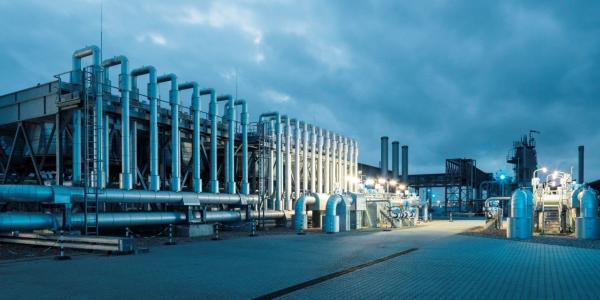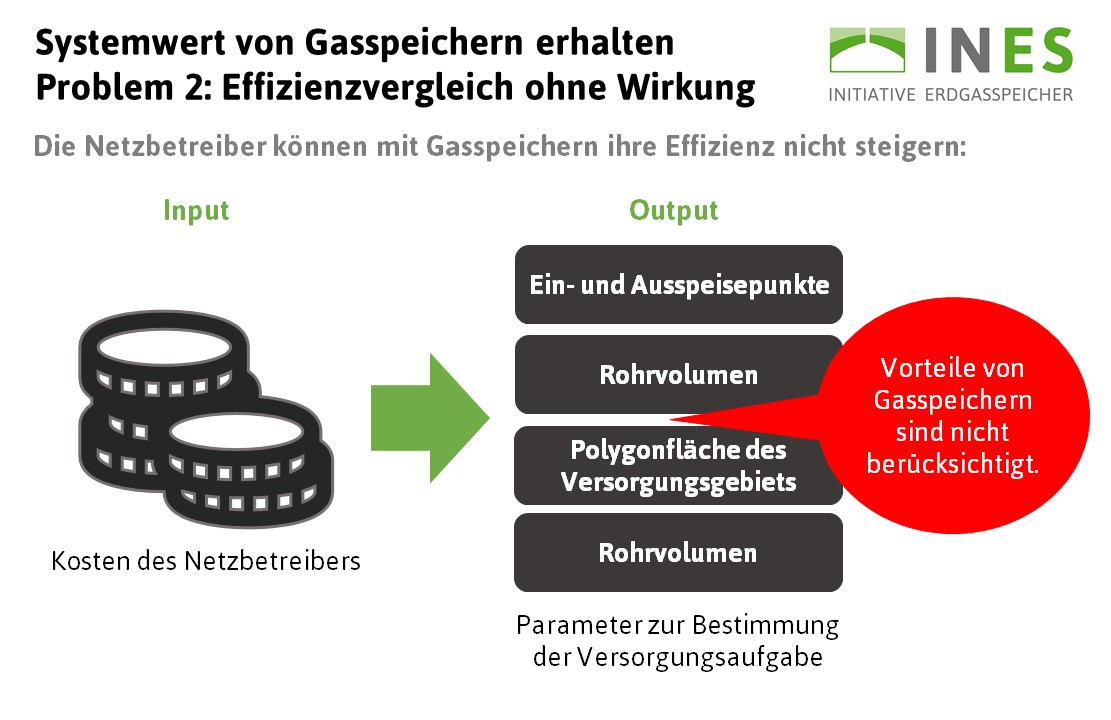Sebastian Heinermann (née Bleschke)
Managing Director
Contact:
+49 30 364180 86
info@energien-speichern.de
Foto:
studioline Photostudios GmbH


The German gas storage system reduces the costs of the energy system by more than two billion euros every year. However, the current regulatory framework in Germany counteracts this advantage. Therefore, regulatory adjustments are needed to enable an integrated view of the gas infrastructure and save the system value of gas storage.
Download Enervis StudyIn Germany, the interaction of gas grids and gas storage ensures the gas supply. The gas pipeline network transports the gas to consumers such as households or industry. To finance the expansion and modernization of gas networks, consumers pay network charges. At the moment these grid charges account for almost a quarter of the gas price in Germany and are therefore a significant cost driver of the gas price.
The other important part of the gas infrastructure is gas storage. Especially in winter, gas storage covers an increased gas demand of consumers flexibly and locally. If gas storage did not exist in Germany, we would have to serve consumers throughout the year via gas imports from abroad. For this purpose, Germany would need a variety of new gas pipelines. This excessive expansion of gas networks means higher network charges and thus rising prices for consumers. Overall, gas customers would have to cover rising costs of more than 1.4 billion euros per year.
An exclusive supply of gas imports to customers also leads to more costly transport routes and supply uncertainties. Without gas storage, even protected customers such as hospitals or households in certain regions could be cut off from gas supply on cold days. At the same time, gas supply would be inefficient, as the additional networks are not needed most days of the year.
A gas infrastructure that relies on the supply of gas storage not only avoids costs for excessive grid expansion. The gas storage facilities also optimize the utilization of existing gas networks and ensure that energy is available when it is needed. All in all, gas storage creates cost savings, which mean a system value of more than two billion euros for the European economy.
This value is the central result of the study “System Value of Gas Storage – Intelligence instead of Steel”. On behalf of INES, Enervis Energy Advisors GmbH investigated to what extent the costs of the energy system would increase without the German gas storage facilities. For the first time, Enervis has quantified the system value of the German gas storage facilities in detail.
The regulatory framework does not adequately acknowledge the importance of gas storage for the energy system. This is mainly due to a lack of incentives in the German incentive regulation. The incentive regulation is a set of rules designed to ensure that energy network operators operate as cost-effectively as possible.
At the moment, however, the incentive regulation is forcing the operators of German gas grids to invest in grid expansion rather than using low-cost gas storage. This is due to the following problem:
The Incentive Regulation Act (Anreizregulierungsverordnung) sets out the costs which network operators can refinance via network charges. The relevant value is the so-called revenue cap. This is the upper limit of revenues that each network operator is allowed to derive from the network charges for a five-year regulatory period. The revenue cap is defined as the cost of network operators in a base year, which is three years before the next regulatory period.
If a network operator falls short of the revenue cap at his actual cost, he can skim the difference short-term as a profit within the regulatory period. The then lower costs, however, define the next revenue cap as part of the next base year. This in turn means that the profit opportunity is eliminated in the long run, because it does not exist in the subsequent regulatory period.
Operating costs therefore offer no or only a very short-term opportunity to earn profits. By contrast, investment in properties, plants and equipment is quite different. Network operators can write off these investments over decades and are benefiting from a guaranteed, fixed rate of return during this time.
Instead of generating profits through a reduction in operating costs, it is more attractive for the network operator to invest. Investing in new gas networks is therefore generally more profitable for the network operator than the cost-effective use of gas storage. The economic advantage of the gas storage is lost in the process.
To offset this effect of incentive regulation, another instrument of regulation exists for network operators: the efficiency comparison. Based on a cost audit, this instrument determines the individual efficiency for each network operator in comparison to the other network operators in Germany.
The problem: The efficiency comparison does not look at the existing inefficiencies in network development. To make it specific: A network operator that builds expensive networks should be less efficient than a network operator that relies on more cost-effective use of gas storage. However, the opposite is the case.
The reason for this lies in the design of the efficiency comparison: the efficiency comparison outlines the costs that a network operator has for his supply mandate. While the costs are “easy” to define, the supply mandate – for outsiders hardly comprehensible – is defined by so-called comparison parameters. These include, for example, the pipe volume of gas networks or the area of that is supplied by a grid operator.
In concrete terms, the efficiency comparison therefore examines at what specific costs network operators provide pipe volumes, for example. Exactly at this point, that means at the point of defining the comparison parameters, lies the problem. The comparison parameters do not consider the use of gas storage.
In the current logic of the efficiency comparison, a network operator using gas storage is automatically more inefficient than a network operator that is expanding its network. Even if the use of gas storage is cheaper. This is ultimately because although the costs of gas storage use are included in the efficiency comparison, the grid expansion avoided with a gas storage is not recognized as part of the supply mandate.

In order to maintain the system value of gas storage facilities in Germany, the political framework conditions need to be changed. From the perspective of INES two measures are required in particular:
In order to allow grid operators to balance between grid expansion and the use of gas storage facilities in the future, the efficiency comparison must be adapted. The parameters of the efficiency comparison should be extended in such a way that the savings that a network operator generates using gas storage is also included. If the network operators uses gas storage for their supply mandate, this use is equivalent to the expansion of the gas networks in the efficiency comparison system.
The efficiency comparison then ensures that those grid operators who develop an optimal ratio of grid expansion and gas storage use also receive a higher efficiency value. The existing legal framework does not need to be changed for this parameter adjustment. An adjustment of the parameters can easily be done as part of the preparations for the next efficiency comparison.
The operators of German long-distance transmission networks acknowledge the German gas storage facilities in the current scenario development report for the network development plan Gas 2020 until 2030 as a central element for optimizing grid development.
However, the actual scenario development for the gas network planning contradicts this statement: It takes as an assumption a total German storage level of only 35 percent. With this low assumption, network operators largely ignore the potential of gas storage. They unnecessarily increase the computationally required grid expansion and at the same time destroy the system value of gas storage.
INES therefore calls for a paradigm shift. The regulatory framework should be adjusted to always provide the storage levels needed to reduce grid expansion. In addition, it makes sense to make a firm distinction between the use of market-based instruments – such as the use of gas storage facilities – and grid expansion in the future development of gas networks.
The system value of gas storage is essentially to avoid excessive network expansion. At the same time, the system value continues to exist only if network expansion does not nullify it. If grid expansion takes place at locations where gas storage is a cheaper alternative, system costs increase. The use of gas storage and network development must therefore be optimally balanced in order to create a favorable energy system.
This balance is not given under the current regulatory framework. On the contrary: The system value of gas storage is punished rather than rewarded. In the long run, however, no company will provide a service that is not remunerated. In the context of future decisions, the Federal Network Agency can help ensure that the gas storage system value is maintained. This also strengthens the economic efficiency of grid expansion.

Sebastian Heinermann (née Bleschke)
Managing Director
Contact:
+49 30 364180 86
info@energien-speichern.de
Foto:
studioline Photostudios GmbH